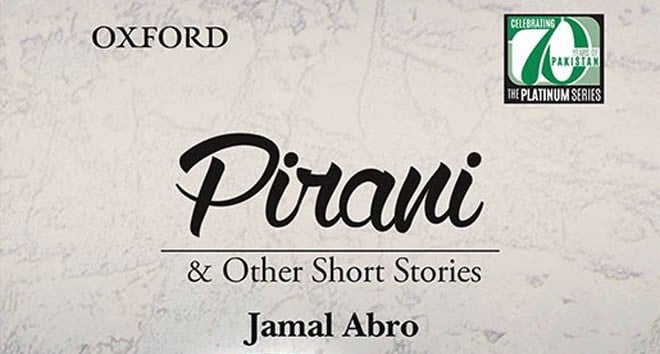
A translation of Jamal Abro’s short stories centred around themes of institutions, values, or outdated customs

Reading translations of literature from one language to another is always fraught with unintended meaning and interpretation. If the reader is only aware of one language and totally unaware of the other, the translation becomes laden with inexactness. This difficulty or hurdle has been -- so to say -- jumped over in the translation of Jamal Abro stories, under the title Pirani & other Short Stories, by printing a small paragraph, a few lines, about the context under which the stories have been written.
These small jottings explain the cultural environment and the ethos particular to Sindh, and make a deeper comprehension of the 16 stories easier. But at the same time, these contextual paragraphs are also more prone to be taken as a direction or a lesson on how to read the story.
These paragraphs also probably support a critical view that stories, or literature in its most general sense, has an integral relationship with the society that it belongs to. This approach can be seen in two ways; one is that it helps those who are not familiar with the culture and language of Sindh, the other is that these contexts will imperceptibly force readers to look at the stories with blinkers.
The view that the stories, or for that matter literature, are supposed to be only seen within a particular context, and as a panacea for a way out of that malaise, is misleading. In other words, the writer is supposed to identify a problem in society and then present a solution to an ailment of society. As a messiah pointing a finger in a certain direction is a perception of the progressive writers who saw themselves as redeemers, the vehicles for the propagation of a view or creating of an awareness that was seen to be more enlightened to take society to another level and pitch itself towards the freedom of the individual from the shackles of a decadent society.
Perhaps in today’s world that self-certainty is no longer freely available. The messiah has lost his miracle to become only a prodder that may suggest a few things tentatively without the certainty of prophet hood.
In an instance from the book, in the story "Hair Parting" the contextual paragraph conditions the way you are supposed to read the story: "Discrimination against women is the inbuilt characteristic of male dominated societies where women are not only denied the freedom to choose their spouse but also sold and exchanged like ordinary commodities. Here a matrimonial contract is no different from barter trade. In these rigid societies when a woman wants to exercise her right to love, she is treated as fallen from grace worthy of not even the right to life. When the inner demands of the soul ask a very high price, it is simply a choice between love and life."
Similarly, in the paragraph preceding "Pishu Pasha", the translator writes: "The effects of the Bolshevik Revolution like in other parts of Asia also influenced Pakistan and its impact on Sindhi literature were quite prominent. Though the local communists and socialists movements miserably failed to gain a strong foothold in Sindh as well as in Pakistan, a revolutionary romanticism continued to influence the local writer till the doom of Soviet Union. This story also tried to depict the revolutionary fantasies of the writers of that turbulent period. Though hued in rather crude literary propaganda this story depicts the zealous fantasies and lofty dreams of the contemporary half backed left leaning writers of Sindh".
In the story, the Pishu, the rebel protagonist, is executed for his activities and this is how the story concludes: "From the gallows hundreds and thousands of Pishus appeared flying in the sky. Their heads were in their palms and their clothes covered red with blood. They gathered in the factories, armies, fields, valleys and caves. The jingling of their weapons and the songs of Nazo spread in the air like a whirlwind, razing every outdated structure. Big and high whirlwinds that carried the particles of the earth up into the sky".
The translations into English have been by various persons accredited at the end of each story. Though this adds diversity to the subject, it also results in variation in quality. Jamal Abro, who passed in 2004, was a very well-known writer of the Sindhi language and a respected name of Sindhi literature. Besides serving in various capacities, he became a leading Sindhi short story writer with the publication of his collection Pishu Pasha which set a new trend in Sindhi literature. He has also penned a five volume autobiography and written on social issues like karo kari.
The writer follows realism, since most of the themes are drawn directly from society. These themes are on institutions, values, or customs that have been keeping people from realising themselves the way they are meant to in contemporary times.
His stories capture the essence of life of rural people in Sindh with its diversity, specific characteristics and the penetration of the Sindhi social order. Apart from providing information about that society, the stories also carry finer aspects of plot and characterisation. This book fills the gap of the dearth of accessible Sindhi literature in English.